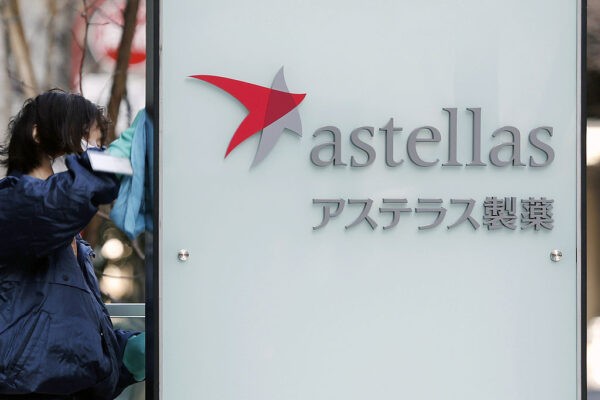Astellas Strikes Another Deal to Expand in Cancer, Partnering With PeptiDream
July 27, 2023
Source: drugdu
 317
317

Photo: Kiyoshi Ota/Bloomberg, via Getty Images
Astellas Pharma is far from alone in viewing cancer as a major growth area, but the Japanese drugmaker has specifically identified a type of therapy called targeted protein degradation as one of the key areas for increasing revenue. It just struck its second deal in the past two months to help it execute on that strategy and perhaps stand apart from others pursuing the same type of drugs.
Under a partnership announced Tuesday, Astellas will work with PeptiDream to discover new protein degraders using the technology of that company. Specific targets were not disclosed, but they will be selected by Astellas. The deal also grants Tokyo-based Astellas the option to select up to three additional targets for inclusion in the collaboration. Astellas will pay PeptiDream 3 billion yen (about $21 million) up front. PeptiDream, based in Kawasaki, Japan, is eligible to receive up to 20.6 billion yen (about $145.8 million) in milestone payments for each target.
Targeted protein degradation leverages a cell’s built-in system of disposing of old or damaged proteins as a way to get rid of cancer-causing proteins. Those proteins are directed to this system with a small molecule that recruits a molecular tag that marks a protein for disposal. Targeted protein degradation is a hot field. Kymera Therapeutics and Arvinas are among the biotech companies developing small molecules for targeted protein degradation, both of them in partnership with large pharmaceutical companies.
PeptiDream’s peptide discovery platform technology identifies macrocyclic peptide candidates. Macrocyclic peptides are larger than small molecules, giving them some features that are characteristic of large molecules. But unlike large molecules, macrocyclic peptides can be made into an oral drug. Also important, it’s hoped that macrocyclic peptides can address targets that are tough to hit with small molecules.
“Targeted Protein Degradation is one of the Primary Focuses of Astellas,” Chief Strategy Officer Adam Pearson said in a prepared statement. “We hope this collaboration will bring synergies between the two companies’ cutting-edge research and will ultimately lead to the expansion of Astellas’ portfolio and development of new therapeutics for patients with significant unmet medical needs.”
Astellas is not abandoning the use of small molecules for targeted protein degradation. Last month, Astellas began a collaboration that will use Cullgen’s technology, which finds ways to target proteins thought to be undruggable. The San Diego-based company received $35 million up front. Astellas could pay Cullgen another $85 million if it licenses the lead program from the collaboration. Cullgen could receive up to $1.9 billion in milestone payments, plus royalties from sales of a commercialized product. The Cullgen deal followed a 2022 alliance with Fimecs focused on discovering small molecule protein degraders against multiple unnamed targets. Financial terms were not disclosed.
Astellas has reached Phase 1 testing with ASP3082, an internally developed drug candidate designed to degrade a cancer target called KRAS G12D. Mutated versions of this protein are found in pancreatic cancer and colorectal cancer among other cancer types.
Astellas’s top-selling product is the cancer drug Xtandi, which is facing patent expirations. In 2021, the company outlined a strategic plan for growing the pipeline and revenue over the next five years. Executives said this strategy will focus R&D on five main areas: genetic regulation, immuno-oncology, blindness and regeneration, mitochondria, and targeted protein degradation. Astellas bolstered the vision part of its corporate strategy in May, announcing the $1.3 billion acquisition of Iveric Bio, whose lead program is a potential treatment for geographic atrophy. An FDA decision for that drug is expected in August.
Source: medCityNews.com
By editorRead more on
- The first subject has been dosed in the Phase I clinical trial of Yuandong Bio’s EP-0210 monoclonal antibody injection. February 10, 2026
- Clinical trial of recombinant herpes zoster ZFA01 adjuvant vaccine (CHO cells) approved February 10, 2026
- Heyu Pharmaceuticals’ FGFR4 inhibitor ipagoglottinib has received Fast Track designation from the FDA for the treatment of advanced HCC patients with FGF19 overexpression who have been treated with ICIs and mTKIs. February 10, 2026
- Sanofi’s “Rilzabrutinib” has been recognized as a Breakthrough Therapy in the United States and an Orphan Drug in Japan, and has applied for marketing approval in China. February 10, 2026
- Domestically developed blockbuster ADC approved for new indication February 10, 2026
your submission has already been received.
OK
Subscribe
Please enter a valid Email address!
Submit
The most relevant industry news & insight will be sent to you every two weeks.



